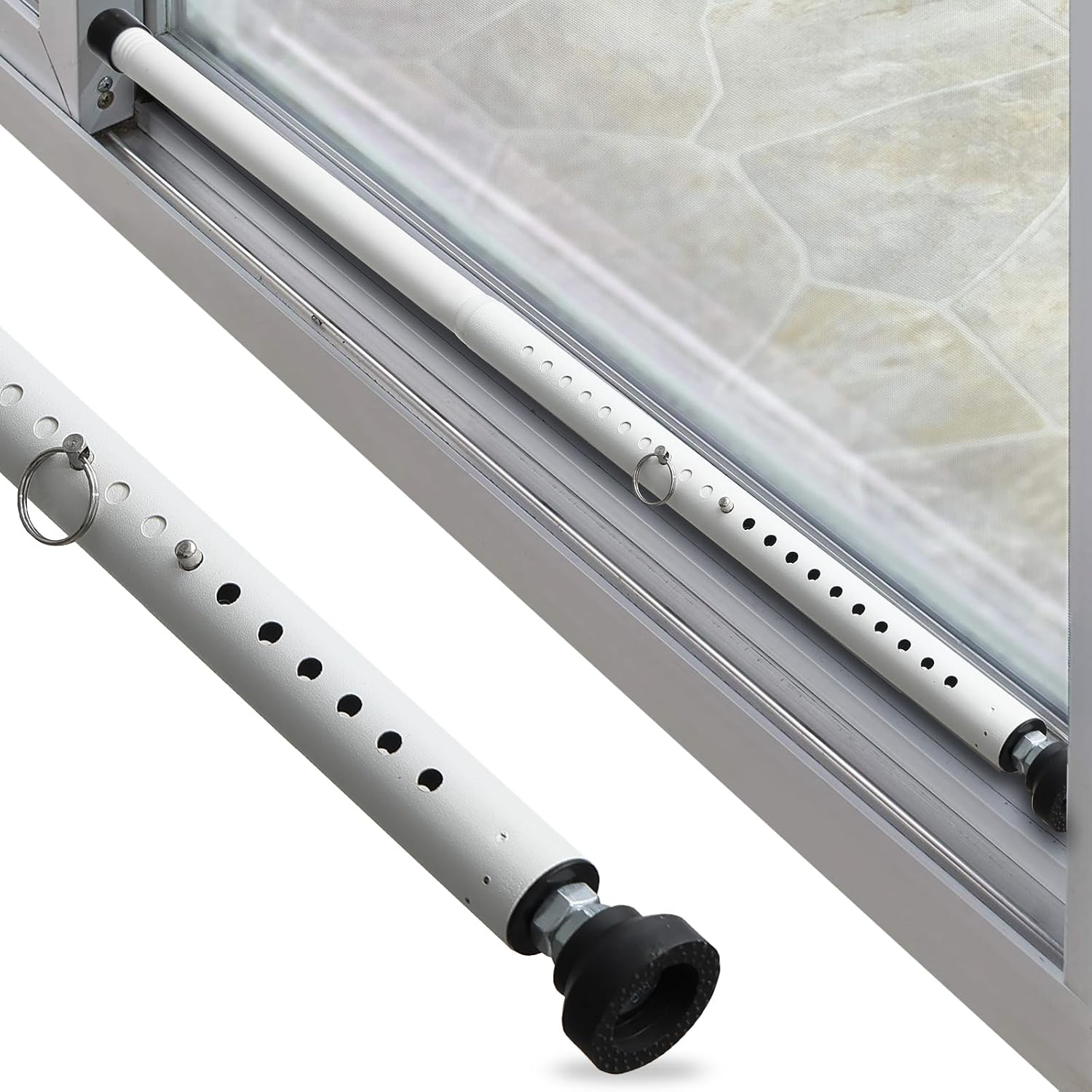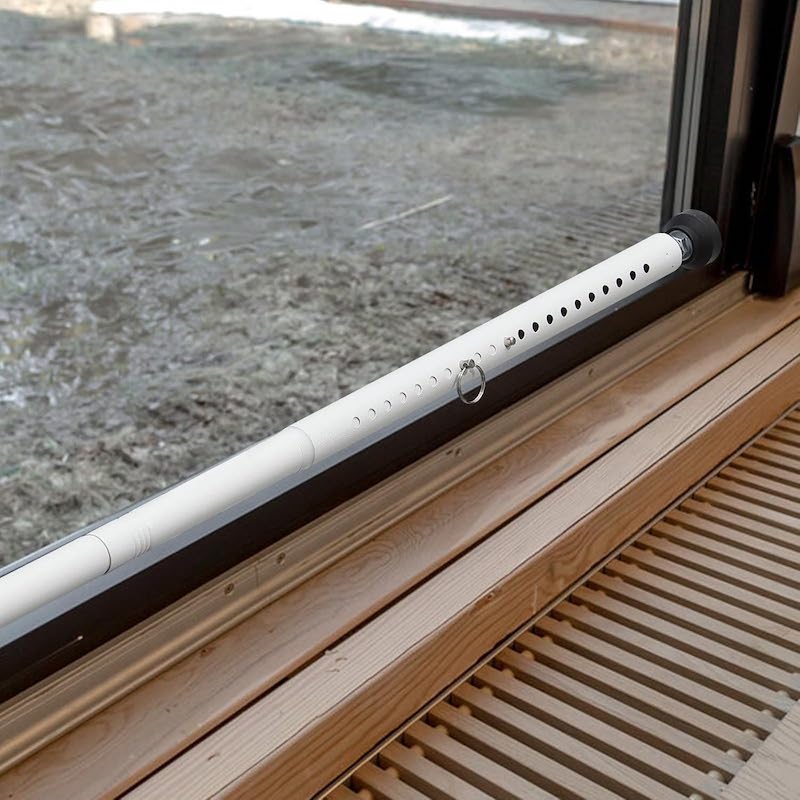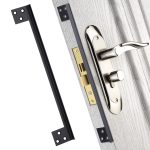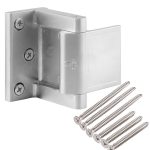Types of Sliding Doors and Vulnerabilities
Sliding doors add beauty and functionality to homes. They come in several types, including vinyl, aluminum, and wood. Each type has unique qualities and potential weaknesses.
Vinyl doors are popular for their durability and low maintenance. However, they can warp with extreme temperatures. This warping can create gaps. Gaps weaken sliding door security.
Aluminum doors offer strength and are light-weight. But they are prone to dents and scratches, which can compromise the door structure over time. Damaged doors are easier to break into.
Wooden sliding doors provide a classic look. They are susceptible to rot and termites if not properly cared for. Decay affects the door’s integrity, making it a security risk.
A common vulnerability among sliding doors is their lock system. Standard locks on these doors are often flimsy and easily jimmied open by intruders. Intruders know to target these weaknesses.
Another issue is door alignment. Misaligned doors can leave openings or be forced off their tracks. Once off the track, doors can be removed completely.
Glass panels in sliding doors are also points of vulnerability. Traditional glass can shatter upon impact. Shattered glass provides a quick entry point for burglars.
Using key ‘sliding door security’ steps can mitigate these risks. It involves upgrading locks, ensuring proper alignment, and reinforcing glass. These practices add layers of protection, discouraging intruders. Our next sections will cover these security measures in detail.
Essential Security Measures for Sliding Doors
Enhancing sliding door security is crucial to prevent unauthorized access. Key measures include upgrading the lock system, aligning the door properly, and reinforcing the glass. Each step serves as a deterrent to potential intruders.
Upgrading Lock Systems
Standard locks on sliding doors are often weak. Replace them with advanced locking mechanisms. High-quality deadbolts or double-bolt locks greatly increase security.
Ensuring Proper Door Alignment
Check the door’s alignment regularly. Adjust rollers and tracks as needed. This prevents gaps and keeps the door on its track, making it harder to force open.
Reinforcing Glass Panels
Glass is a vulnerable point. Apply shatter-proof films or install tempered glass. These reinforcements resist impacts, deterring break-in attempts through the glass.
Implement these essential security measures to fortify your home’s sliding doors. Each action contributes to a safer and more secure living environment.
Advanced Locking Mechanisms and Their Benefits
Enhancing sliding door security often starts with the lock. Standard locks may fall short in preventing break-ins. Advanced locking mechanisms offer greater resistance to tampering. They provide numerous benefits for homeowners.
Key Advantages of High-Quality Locks
Advanced locks come with features that standard ones lack. Here are the key advantages:
- Increased Strength: Heavy-duty locks made of stronger materials are harder to break.
- Complex Locking Mechanisms: Intruders find them challenging to pick or bypass.
- Deterrent Effect: Visible, high-quality locks can deter burglars before they attempt to enter.
- Peace of Mind: Knowing your doors are safely secured can give you a sense of calm.
Other benefits include potentially lower insurance premiums, as enhanced security can reduce risk. High-quality deadbolts or double-bolt locks, specifically, make breaking in far more difficult. They require significant force or specialized tools to compromise. For sliding door security, this upgrade is a must.
Choosing the right lock involves assessing your home’s specific needs. Opt for locks with a reputation for strength and reliability. A professional can help with selecting and installing the best lock for your doors. Regularly maintain these locks to ensure they remain effective over time.
The Role of Shatter-Proof Glass in Door Security
In the realm of sliding door security, shatter-proof glass plays a pivotal role. This type of glass, once applied or installed, bolsters your door’s resistance against forceful entry. Let’s delve into the benefits and how it fits into the security setup of your home.
Shatter-proof glass has a tough film. When applied to your existing glass door, it holds the glass together upon impact. This delays and often prevents intruders from quickly entering through shattered panels.
Here are the main benefits of shatter-proof glass:
- Intrusion Resistance: Makes breaking in through the door a time-consuming challenge.
- Injury Prevention: Protects against injuries from broken glass in case of accidents.
- UV Protection: Often blocks harmful UV rays, contributing to your home’s comfort.
Equipping your sliding doors with shatter-proof glass is a straightforward process. Experts can apply a security film to the existing panes, or replace them with tempered versions. Tempered glass is heat-treated to be stronger than ordinary glass.
In conclusion, for comprehensive sliding door security, consider integrating shatter-proof solutions. They add a critical layer of protection that could make all the difference during a break-in attempt.
Implementing Alarms and Security Sensors
Alarms and security sensors play a crucial role in reinforcing sliding door security. By alerting homeowners of any unauthorized attempts to open the door, these devices act as an essential deterrent to burglars. Let’s examine how they contribute to your home’s defense system.
- Immediate Alerts: Alarms sound loudly when a break-in is attempted, alerting you and potentially scaring off intruders.
- 24/7 Monitoring: Security sensors can monitor your sliding doors at all hours, ensuring constant surveillance.
- Smart Integration: Many alarms and sensors now connect to smartphones for real-time updates, no matter your location.
- Customized Setups: Tailor your alarm system to fit the specific needs of your home and sliding door security.
To maximize effectiveness, position sensors at key points like the door frame and glass panels. Choose systems that trigger loud alarms and send instant notifications. For optimal sliding door security, combine these alarms and sensors with the measures previously discussed. The added layers of protection will enhance the security of your home and give you peace of mind.
The Importance of Proper Door Installation and Maintenance
Proper door installation and regular maintenance are key to enhancing sliding door security. These practices ensure that sliding doors function correctly and remain a reliable barrier against potential intruders.
Quality Installation Ensures Alignment
Correct installation is critical for sliding door security. It guarantees doors align accurately with their tracks. Aligned doors close tightly without gaps, keeping security intact. Choose professional installers who understand the importance of precision.
Regular Maintenance Preserves Door Function
Ongoing maintenance supports your door’s longevity and security. Check the tracks and rollers often to spot any issues. Lubricate moving parts to maintain smooth operation. Tighten any loose screws and replace worn-out parts promptly. This helps avoid common problems that can compromise door security.
Addressing Wear and Tear Promptly
Doors suffer natural wear and tear over time. Address these changes quickly to prevent security gaps. Look for signs of damage or decay, especially in wooden doors. Repairing or replacing affected parts stops further deterioration.
In sum, installation and maintenance are vital. They form part of a solid sliding door security plan. Regular care keeps doors at peak performance, deterring burglars effectively. Combine this with other security measures for best results.
Utilizing Curtains and Blinds for Added Privacy and Protection
Curtains and blinds are not just for decor; they boost sliding door security. They offer a visual barrier, which makes it hard for intruders to spot your valuables. Their presence can make a criminal think twice before attempting a break-in. Here’s how they can help.
- Visual Deterrent: Curtains or blinds can hide the inside of your home from view. This discourages thieves who rely on quick visuals to choose targets.
- Additional Layer: When closed, they serve as an extra layer to breach. This can slow down an intruder’s progress.
- Versatile Options: There are many styles to choose from. Some blinds and curtains can even be linked to smart home systems. This lets you open and close them remotely, giving the illusion that someone is home, even when you’re not.
- Energy Efficiency: They can also increase energy efficiency. This is a plus for both your utility bills and sliding door security.
For optimal use, pair heavy-duty curtains or blinds with your existing security measures. This strengthens the layered approach to home protection. Remember to close them, especially at night or when you’re away from home. Just like locking your doors or setting your alarm, it’s a simple habit that can significantly improve sliding door security.
Best Practices for Daily Sliding Door Security
To keep your sliding doors safe every day, follow these simple but effective practices:
- Lock the Door Consistently: Always lock your doors, even when you’re at home. Make it a habit.
- Check for Gaps and Alignment: Regularly inspect doors for gaps or misalignment and fix issues right away.
- Use Visual Deterrents: Curtains and blinds should be closed especially during night or when away.
- Apply Security Films: Consider adding security films to your glass for added resistance to impacts.
- Stay Alert: Be aware of your surroundings. Look out for suspicious activity near your doors.
- Educate Family Members: Teach all household members about sliding door security and good practices.
- Perform Maintenance Checks: Service your doors and locks regularly to ensure they work properly.
By adopting these habits, you enhance the daily security of your sliding doors, keeping your home safer from potential threats.





